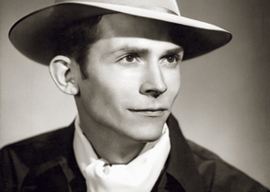
July 11, 2013

Hank Williams
Two strong impressions from the narrative so far (I’m up to 1956): the terrific burst of affluence and the revolutionary nature of TV.
The advent of TV probably effected some major and permanent rewiring of the human brain. It sure did things to social life. Kynaston quotes John Fowles’s diary for 1956:
The drinkers in the pub sat in silence, watching, not drinking. Transfixed by the shimmering screen, like the first cavemen to make fire. Agape. And such rubbish….Desecration of most sacred themes”death, birth….
The affluence likewise transformed us irrevocably. I can clearly remember, yet hardly believe, the bareness of pre-affluence life. Now we are overwhelmed by cheap manufactured goods”great tsunamis of them. And the future comes apace: 3-D printers, autonomous cars. Where are we headed?
The coming Midas plague. I think we all have a rough idea.
Fewer Than Half Of Americans Have Full Time Jobs…
101M Get Food Aid from Federal Gov’t; Outnumber Full-Time Private Sector Workers…
We can produce goods, and increasingly services, in colossal abundance without the need of many people. We still need plumbers and dentists, but not production-line workers, supermarket-checkout clerks, telephone-switchboard gals, or travel agents.
So what shall we all do? The logical answer is: consume. That was the premise of Frederick Pohl’s 1954 story The Midas Plague. From Kingsley Amis’s synopsis:
We open with a wedding reception in the quarter-acre, fountain-studded ballroom of the gigantic mansion owned by the hero, Morey Field, complete with its nine special-function robots. The bride’s parents, wearing rented garments, eventually drive off in a miniature runabout to their five-room cottage, full of foreboding about the advisability of rich folks marrying poor folks.
The joke is that they are the rich folks, while Morey is poor: “for in this society the poor man is he who must consume more than his neighbor.”
Neal Stephenson worked up a more sophisticated version of this theme in The Diamond Age. The future will not be exactly like either story, but the broad theme is right. I can recall my dad riding to work on a bicycle because we couldn’t afford a car. Now cars are a prole thing, while yuppies ride bikes.